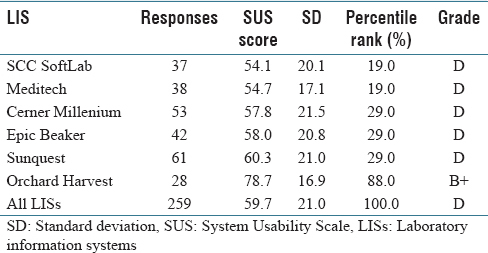Difference between revisions of "Template:Article of the week"
Shawndouglas (talk | contribs) (Updated article of the week text.) |
Shawndouglas (talk | contribs) (Updated article of the week text.) |
||
| Line 1: | Line 1: | ||
<div style="float: left; margin: 0.5em 0.9em 0.4em 0em;">[[File: | <div style="float: left; margin: 0.5em 0.9em 0.4em 0em;">[[File:Tab2 Matthews JPathInfo2017 8.jpg|240px]]</div> | ||
'''"[[Journal: | '''"[[Journal:Usability evaluation of laboratory information systems|Usability evaluation of laboratory information systems]]"''' | ||
Numerous studies have revealed widespread clinician frustration with the usability of [[electronic health record]]s (EHRs) that is counterproductive to adoption of EHR systems to meet the aims of healthcare reform. With poor system usability comes increased risk of negative unintended consequences. Usability issues could lead to user error and workarounds that have the potential to compromise patient safety and negatively impact the quality of care. While there is ample research on EHR usability, there is little [[information]] on the usability of [[laboratory information system]]s (LIS). Yet, an LIS facilitates the timely provision of a great deal of the information needed by physicians to make patient care decisions. Medical and technical advances in genomics that require processing of an increased volume of complex [[laboratory]] data further underscore the importance of developing a user-friendly LIS. This study aims to add to the body of knowledge on LIS usability. ('''[[Journal:Usability evaluation of laboratory information systems|Full article...]]''')<br /> | |||
<br /> | <br /> | ||
''Recently featured'': | ''Recently featured'': | ||
: ▪ [[Journal:Data management: New tools, new organization, and new skills in a French research institute|Data management: New tools, new organization, and new skills in a French research institute]] | |||
: ▪ [[Journal:Comprehending the health informatics spectrum: Grappling with system entropy and advancing quality clinical research|Comprehending the health informatics spectrum: Grappling with system entropy and advancing quality clinical research]] | : ▪ [[Journal:Comprehending the health informatics spectrum: Grappling with system entropy and advancing quality clinical research|Comprehending the health informatics spectrum: Grappling with system entropy and advancing quality clinical research]] | ||
: ▪ [[Journal:Energy informatics: Fundamentals and standardization|Energy informatics: Fundamentals and standardization]] | : ▪ [[Journal:Energy informatics: Fundamentals and standardization|Energy informatics: Fundamentals and standardization]] | ||
Revision as of 16:42, 4 December 2017
"Usability evaluation of laboratory information systems"
Numerous studies have revealed widespread clinician frustration with the usability of electronic health records (EHRs) that is counterproductive to adoption of EHR systems to meet the aims of healthcare reform. With poor system usability comes increased risk of negative unintended consequences. Usability issues could lead to user error and workarounds that have the potential to compromise patient safety and negatively impact the quality of care. While there is ample research on EHR usability, there is little information on the usability of laboratory information systems (LIS). Yet, an LIS facilitates the timely provision of a great deal of the information needed by physicians to make patient care decisions. Medical and technical advances in genomics that require processing of an increased volume of complex laboratory data further underscore the importance of developing a user-friendly LIS. This study aims to add to the body of knowledge on LIS usability. (Full article...)
Recently featured:










